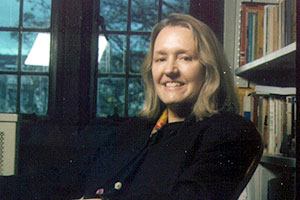![[Chronicle]](/images/sidebar_header_oct06.gif)
Vol. 26 No. 4
current issue
archive / search
contact
Past Opine interviews:
Lauren Berlant
Stephen Berry
John Boyer
David Cohen
Jerry Coyne
John Cunningham
Richard Epstein
John Frederick
Henry Frisch
Austan Goolsbee
Bernard Harcourt
Greg Jackson
Martin Marty
Martha Nussbaum
Raymond Pierrehumbert
José Quintáns
Jan-Marino Ramirez
Saskia Sassen
William Sewell
Herman Sinaiko
Geoffrey Stone
Cass Sunstein
Simon Swordy
Opine: Saskia Sassen
 Saskia Sassen | |
This week Saskia Sassen, the Ralph Lewis Professor in Sociology and the College, is of the opinion . . .
What book would you recommend every person read and why?
Michael Marrus’ The Unwanted, because of our times. This book is a look at modern history through the lens of one question: How has the modern state handled the “outsider” — whether a refugee or a long-time foreign-born resident?
Who—dead or alive—is your favorite scholar, author, composer, musician, entrepreneur?
Scholar: There is no single one. But right now, given what I am working on, Max Weber.
Author: Ernesto Sabato
Composer: Steve Reich
Musician: Laurie Anderson
Entrepreneur: Muhamed Yunis, founder of Grameen Bank, for recognizing that giving a poor woman entrepreneur a $50 loan would work. The more than 100 million loans extended have worked even better than predicted: loan repayment rates are much higher than average for all types of loans, and the multiplier effects for recipients are also higher than expected.
Of these people, who is the one person you’d prefer to meet and converse with?
Ernesto Sabato
If you consider some of the more complex moral and political issues that affect humanity, which issue or problem do you believe will never be resolved and why?
Abuse of power. Why? Because its possibility is built into the condition itself of power— dangerous in a world of enormous power inequalities.
If politicians had to pass an exam before they were allowed to take public office, what question would you add to the test?
How do you deal with the fact that there is much congressional work to do and much political positioning to secure?
If you could choose any three University professors and give them a one-year sabbatical together to solve a problem, develop a theory or make a discovery, what task would you assign them to work on?
Financial firms and exchanges have used the new interactive digital technologies far more aggressively and innovatively than most other types of users—finance as a vanguard. To do this, finance has had to push developments of the technologies, but also invent new legal and accounting instruments, and whole new cultures of work. Projects as diverse as democratizing power, redistributing resources and fighting global warming could benefit greatly from changes in some of the particular legal, technical and cultural frames that organize use of those technologies today. There are many possible collaborators at the University. For starters, a computer scientist, a legal scholar and a sociologist: Ian Foster, Cass Sunstein and Karin Knorr Cetina.
The University has academic traditions, such as the Humanities Open House and the Aims of Education Address, and some more recreational, such as the Latke-Hammentash Debate and the annual student Scavenger Hunt. If you were asked to create a new University tradition, what would it be?
A NEW DAY — Big Blunder in a Discipline (such as the cold fusion debacle in physics).
Think of a renowned scholar from the past, now dead, who added great value to your area of study. What do you believe this person would think of the advances that recently have been made in this area?
Again, the times matter. The question I am after right now is the possibility of democratizing power at a time of vast, and often basically legalized, abuses of power. Through his study of the making of law, especially urban law in medieval times, Max Weber (and contemporary scholars as diverse as Harold Berman and Gerald Frug) can help us understand how we could make constitutive, participatory and secular forms of law at scales other than the national—both subnational, as in cities, and transnational scales.